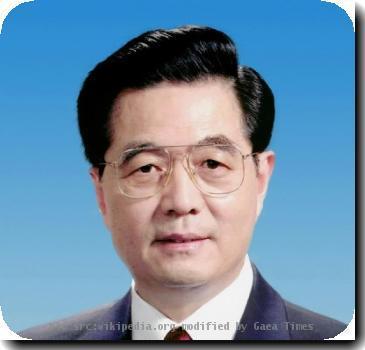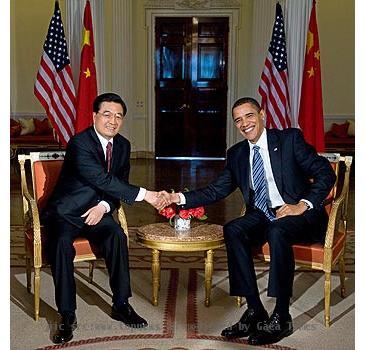Worn and frail, NKorea’s Kim Jong Il scales down secret visit to China over nukes, aid
By Christopher Bodeen, APFriday, May 7, 2010
Frail NKorean leader makes scaled-down China visit
BEIJING — The pompadour was gone, along with much of the paunch. North Korea’s 68-year-old dictator Kim Jong Il appeared shriveled and worn during this week’s scaled-down visit to China, signs that his health has deteriorated.
Kim, who almost never travels abroad, had clearly lost weight and hair and appeared to show signs of a stroke reportedly suffered in 2008. His left arm hung at his side much of the time, and he walked with a limp as is common among stroke patients.
South Korean experts also report Kim, known as heavy drinker, is undergoing kidney dialysis every two weeks.
Analysts pronounced the visit a success, with state media reporting that Kim had pledged to return to six-nation nuclear disarmament talks that North Korea abandoned in December 2008. He also appeared to have obtained much-needed economic assistance from China.
While the five-day visit was officially termed “unofficial” — freeing Kim from physically taxing events such as a formal welcoming ceremony — the fact that he made the journey at all shows how desperate he is for Chinese support, said Kim Dong-gil, deputy director of Peking University’s Center for Korean Peninsula Studies.
“That shows that they really badly need Chinese help, militarily, economically and most important, politically,” said Kim.
Another analyst said the diminutive dictator may have traveled to Beijing to seek approval for his succession plans. Kim is said to be grooming a son, Kim Jong Un, to succeed him.
“They want that blessing,” said Jin Canrong, of Beijing’s Renmin University.
There was no sign that Kim’s putative heir accompanied him on the trip.
Accompanied by his top military and Communist Party leaders, Kim’s activities were more circumscribed than in previous visits, limited to excursions to industrial zones in four cities, a banquet and a handful of meetings with Chinese leaders.
Television footage aired on Friday — the first official Chinese confirmation of his visit — showed Kim shaking hands with Chinese leaders at Beijing’s Great Hall of the People, footage apparently shot Wednesday night. He exchanged comments with President Hu Jintao in a conference room, then stood and read from a piece of paper at a banquet table and exchanged toasts with red wine.
Other footage showed him visiting a biotechnology firm accompanied by Hu, during an excursion to Beijing’s Zhongguancun high-tech zone believed to have happened Thursday morning. The eccentric Kim is known to shun air travel and travels entirely by road and rail.
Despite his frail appearance, Kim’s visit may have been intended to show that he remains in charge, said Kim Yong-hyun, a professor of North Korean affairs at Seoul’s Dongguk University.
“It sends a message to the world that he is healthy and has no trouble running the country,” Kim said.
The visit that began Monday had been shrouded in secrecy in keeping with Kim’s reclusive ways. His armored train crossed the border back into North Korea midmorning after leaving Beijing on Thursday.
Kim’s regime has been flailing from years of international sanctions, economic mismanagement, and a recent failed currency revaluation. It has grown ever more dependent on Chinese aid, investment, and diplomatic support, particularly in the wake of deteriorating ties with South Korea. Beijing appears eager to provide such support to prevent his impoverished country’s implosion, which could touch off severe unrest on its border.
China, which sent troops to back North Korea during the 1950-53 Korean War, already provides most of the aid needed to prop up the economy and feed the North’s malnourished population of 23 million.
“The visit has been in the interest of both parties,” said Peking University’s Kim. “It has helped stabilize North Korea’s economy and achieve China goal of stability on the Korean Peninsula.”
While no details have been announced, Kim said North Korea had likely won a commitment to provide crucial fertilizer once supplied by South Korea, along with major investments in mining.
In return, China’s official Xinhua News Agency reported that Kim pledged Pyongyang would “work with China to create favorable conditions for restarting the six-party talks.”
South Korea’s Yonhap news agency also reported that Kim told Hu he is ready to return to the talks framework, under which North Korea agreed to dismantle its nuclear programs in return for food and fuel aid. Kim has made similar commitments in the past, but usually attaches conditions, such as a long-sought direct dialogue with the United States. Yonhap did not say what, if any, terms he set this time.
North Korea quit the talks, involving China, Russia, the two Koreas, Japan and the U.S., in December 2008, and then conducted a nuclear test that drew tightened U.N. sanctions.
North Korea’s official Korean Central News agency reported in a dispatch from Pyongyang that Kim said his country was willing to return to the talks and was seeking “a peaceful solution through dialogue.” It also said Kim expressed happiness at having confirmed “trust and understanding” between China and the North.
That gratification is not shared by South Korea, however, where suspicion is rising that a North Korean torpedo destroyed its naval ship Cheonan in March, killing 46 sailors.
North Korea has denied involvement, but Seoul has said denuclearization talks cannot restart until a full investigation into the sinking is complete.
Associated Press Writers Kwang-tae Kim and Jean Lee in Seoul and researcher Zhao Liang in Beijing contributed to this report.
Tags: Asia, Beijing, China, East Asia, Greater China, Hu Jintao, North Korea, Seoul, South Korea

